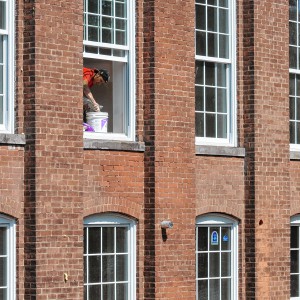Editorial: Proposed 60-member council a mistake in Amherst
| Published: 04-13-2017 8:05 PM |
The Amherst Charter Commission took a big step backward last week when it narrowly endorsed a 60-member town council as part of a package of reforms to replace representative Town Meeting and the Select Board.
Establishing the largest town or city council in the United States would create an unwieldy legislative body that would not solve the problems of Town Meeting that a majority of the Charter Commission want to eliminate. Instead, the large council would likely create new issues, complicating the process of town government.
More reasonable was the commission’s vote in December proposing a 13-member town council to replace Town Meeting, which has 240 members. The plan for that smaller council called for one member elected in each of the town’s 10 precincts, and three elected townwide.
The shift to recommending a 60-member council occurred April 6 after two members of the Charter Commission, Meg Gage and Nick Grabbe, brought forward a “middle-ground” proposal seeking to appeal both to proponents and opponents of doing away with Town Meeting. However, we believe it is simply a repackaging of the current Town Meeting, which has been criticized for acting too independently from the rest of Amherst’s government, most recently in blocking the elementary school project.
The proposal was panned Tuesday night at a session held by the Charter Commission to hear from the public. Residents used words like “grotesque” and “folly” to describe a council with 60 seats, which would bring so many voices to regular meetings that chaos and gridlock would be a likely result. Several residents said they want to elect one councilor who they can hold accountable for representing their precinct.
Many people said voters should instead be given a clear choice between retaining the current form of government — which includes a town manager appointed by the five-member Select Board — and making a clean break to an elected mayor and a reasonably sized council.
We agree that attempting to compromise only dilutes the desired changes: a streamlined legislative body that meets frequently throughout the year, with the ability to advance its own agenda through resolutions or ordinances proposed by councilors and voted on after informed debate.
By contrast, representative Town Meeting does not act as a true legislature because it can only approve or defeat measures placed on its warrant, but cannot change them, and its members do not propose legislation. Finance Committee member Bernie Kubiak has described Town Meeting as “240 people who essentially govern anonymously.”
Article continues after...
Yesterday's Most Read Articles
 South Hadley’s Lauren Marjanski signs National Letter of Intent to play soccer at Siena College
South Hadley’s Lauren Marjanski signs National Letter of Intent to play soccer at Siena College
 LightHouse Holyoke to buy Gateway City Arts, expand offerings and enrollment at alternative school
LightHouse Holyoke to buy Gateway City Arts, expand offerings and enrollment at alternative school
 Treehouse, Big Brothers Big Sisters turn race schedule snafu into positive
Treehouse, Big Brothers Big Sisters turn race schedule snafu into positive
 South Hadley man fatally shot in attempted robbery
South Hadley man fatally shot in attempted robbery
 Granby man admits guilt, gets 2½ years in vehicular homicide
Granby man admits guilt, gets 2½ years in vehicular homicide
 Area briefs: Transhealth to celebrate 3 year; Holyoke to plant tree at museum; Documentary film about reparations focus of Unitarian talk
Area briefs: Transhealth to celebrate 3 year; Holyoke to plant tree at museum; Documentary film about reparations focus of Unitarian talk
Ray La Raja, a professor of political science at the University of Massachusetts who previously served as a Town Meeting member, contends in a letter to the Charter Commission: “Replacing a large Town Meeting with a large Town Council will not solve the structural challenges a large representative assembly poses. Having a large Town Council will provide relative anonymity for its members, with the result that most residents will not know who represents them and who to hold accountable for political decisions — just like Town Meeting.”
A 60-member council is unprecedented in the state and nation. In Massachusetts, Newton has the largest council with 24 members. The Boston City Council has 13 members, and those in Northampton and Easthampton each have nine seats. New York City has the largest council in the country, with 51 members .
Charter Commission members who backed the 60-member council in Amherst say they expect most of its work would be done by subcommittees. But that would increase the number of meetings requiring support from professional staff, likely increasing expenses for the town — and a government apparatus too complex for most residents to follow.
We support Amherst doing away with the representative Town Meeting form of government that it adopted in 1954. An elected mayor with an appointed chief administrative officer makes sense as the executives in charge of leading policy development.
But we strongly urge the Charter Commission to reconsider the size of the town council it will recommend in a draft report expected in July, leading to its final proposal that is due by Sept. 29. Amherst should consider Greenfield, which adopted a new charter in 2002, as a model. It changed from a five-member Select Board, 27-member Town Council and town manager to a mayor and 13-member council.
In this case, smaller is better for Amherst and will give the town a streamlined, more efficient government.

 Columnist Carrie N. Baker: A moral justification for civil disobedience to abortion bans
Columnist Carrie N. Baker: A moral justification for civil disobedience to abortion bans Guest columnists Ellen Attaliades and Lynn Ireland: Housing crisis is fueling the human services crisis
Guest columnists Ellen Attaliades and Lynn Ireland: Housing crisis is fueling the human services crisis Lora Sandhusen: Discourage ultra-wealthy consumption habits with carbon tax
Lora Sandhusen: Discourage ultra-wealthy consumption habits with carbon tax Guest columnist Jena Schwartz: Things I have not said
Guest columnist Jena Schwartz: Things I have not said
